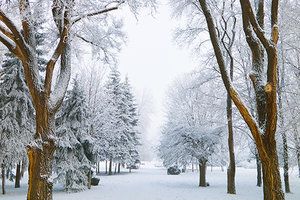The most important relationship I seek to nurture in the treatment room is the one a patient has with their own body. We live in a culture that teaches us to override pain, defer to outside authority, and push through discomfort. Patients often arrive hoping I can “fix” them, but the truth is, we can’t do the work for them. We can offer guidance, insight and support, but healing requires their full participation.
Winter Roots – The Flow of Life
"The will (Zhi) is commander of Qi, while the Qi is that which fills the body. Where the will arrives, the Qi halts. Hence it is said: take hold of your will and do not abuse your Qi." — Mencius
Winter is the season to nourish the kidneys. As clinicians, we tend to think of this as prescribing herbal formulas for nourishing kidney yin and warming kidney yang; or perhaps recommending foods considered kidney tonics in TCM nutrition. However, in the winter months, I regularly include kidney points in my acupuncture point prescriptions to nourish the kidneys as important roots, keeping in mind the TCM statement of fact: "The liver and kidneys share a common source." During the winter season, stress levels can be extremely high, and the liver and kidneys can be both taxed and drained.
Step #1: KiD 1 + Kid 3

The combination of Kid 1 (Gushing Spring) and Kid 3 (Supreme Stream) is my favorite acupuncture point combination for nourishing the kidneys during the winter season. In particular, the combination of these two kidney points, combined with the point combination of the Four Gates (Liv 3 + LI 4), is an extremely important point prescription to consider during the stressful winter holidays. This prescription elegantly courses the qi and nourishes the liver and kidneys, which share a common source.
Beyond the Points
I think it is important for clinicians to give patients tools beyond a bottle of herbs and a fancy combination of acupuncture needling. After the patient gets off the treatment table and leaves the clinic, they return to their stressful lives. So, I always attempt to give patients recommendations for behavior change which can support the kidneys as much, if not more than the previously discussed acupuncture point prescriptions.
Three key areas I focus on with patients to help support the TCM kidneys are: worry, hyperactivity and sleep hygiene. All three have the potential to either supplement or drain the kidneys. If a patient is obsessively worried, constantly "multitasking" and not making sleep a priority, the kidneys will be depleted, and this will eventually lead to issues with the liver and spleen as well. This complex pattern of kidney vacuity with liver / spleen disharmony is what most contemporary integrative practitioners refer to as "adrenal fatigue." Obsessive worry often cross-pollinates into "obsessive thinking," which damages the spleen according to TCM.
Addressing Obsessive Worry
I always encourage patients during the winter season, and in particularly during the holiday months, to keep a gratitude journal, listing all areas of life that do not consume them with obsessive fear or worry. This journal in many ways becomes a medicine and can help remind patients of the roots that can keep them grounded in times of worry.
Any time a patient feels their mind focusing on obsessive worry, I remind them to visit their gratitude journal and focus on areas of life that provide much-needed peace and security. Even the exercise of creating a gratitude journal can help a patient heal from the sickness of constant worry, which drains both the kidneys and the spleen.
Mitigating Multitasking
The behavior of hyperactivity or what is often termed multitasking is another area which will eventually drain the TCM kidneys and is all too common during the stressful winter holidays. In targeting this behavior, I also suggest patients create a journal of sorts and map out activities for the day on paper. Once a patient sits and maps out their daily activities, it often becomes clear whether their day is organized or chaotic – or in many cases, "organized chaos."
During the winter months, I always encourage patients to keep one concept in mind: slow down. Excess activity disperses qi and as a result, often irritates the mind; which over time, drains both the kidneys and the spleen. Liver depression qi stagnation can be another consequence. Helping your patients slow down the pace of their day is just as important for the health of the kidneys as the combination of Kid 1 + Kid 3.
Optimizing Sleep
Last, but not least, sleep hygiene is vitally important to effectively nourish the kidneys during the winter months. Deep, restful sleep is perhaps the most powerful restorative for both the kidneys and the liver. No prescription of herbs or acupuncture needles can replace nights of deep, restorative sleep.
Clinicians should discuss sleep hygiene with any patient suffering from kidney vacuity or liver / spleen disharmony. In fact, clinicians should always keep in mind the importance of sleep for a vital immune system throughout the winter months.
Clinical Pearls
Give your patients tools to take home and implement once the needles are removed and patients leave the clinic. The point combination of Kid 1 + Kid 3 is an important acupuncture point combination to keep in mind when seeking to nourish and supplement the kidneys during the winter months; but always remember that patient habits and behaviors have important implications for health and healing as well. Small, consistent behavior changes are seeds which, when nourished with intelligently administered acupuncture, can reinforce the roots of health and vitality.



